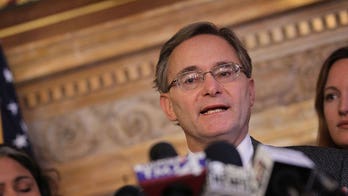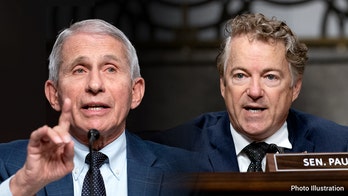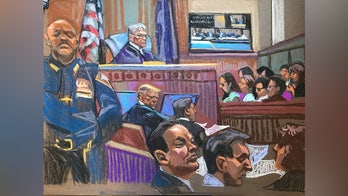Tom DeLay is the reason John Boehner is in line to become Speaker of the House in January.
For those of you lost in a news vacuum, or a tryptophan and pumpkin pie-induced food coma this Thanksgiving, a Texas jury convicted former House Majority Leader Tom DeLay (R-TX) late Wednesday of funneling corporate campaign funds to local political candidates in Texas. The felony conviction could send DeLay to prison anywhere from five years to life, although the former Leader could receive probation.
DeLay is scheduled for sentencing just before Christmas. But he's planning to appeal.
But for Tom DeLay, there would be no John Boehner. At least in the context that places Boehner on the precipice of the House Speakership in just a few weeks.
I often argue that political leadership positions are determined by "particle politics." This is when battles and outcomes are determined at the sub-atomic level as political protons and neutrons crash into one another.
The rise of John Boehner and the fall of Tom DeLay serve as the very essence of political quantum theory when it comes to determining the fates of Congressional figures.
It works like this:
House Republicans were stung in January, 2005. Federal investigators were swarming around figures close to former superlobbyist Jack Abramoff and nipping at associates of DeLay. Many Republicans feared that prosecutors wielding agendas could specifically target DeLay for political gain.
In fact, just a few months before, House Republicans crafted a rule that specifically erected a firewall between prosecutors and DeLay. The rule allowed any party leader or committee chairman to retain his or her position after they were indicted.
The rule change appeared as though it was crafted narrowly to explicitly protect DeLay. And Republicans caught hell from Democrats and ethics watchdogs.
But DeLay realized the rule that could inoculate him from legal trouble could drag down the entire GOP. So in early January, 2005, Republicans did an about-face and eliminated the new rule.
Now top Republicans would have to step aside from their leadership jobs if indicted. In fact, it was DeLay himself who argued for the 180. He suggested that the rule change would strip Democrats of the ability to use the special dispensation against Republicans.
"It allows the Republicans to focus on the issues, the agenda that is before us and not to have Tom DeLay be the issue," said Rep. Zach Wamp (R-TN) at the time.But caveat emptor.
In 1994, President Clinton permitted special prosecutor Robert Fiske to begin probing his Whitewater land deal in Arkansas. It was the president's efforts to clear the air.Four years later, Fiske was gone. But the inquiry continued. And Fiske's investigation of Whitewater evolved into an examination of the Monica Lewinsky affair, led by special prosecutor Ken Starr.
So there was DeLay, vulnerable as ever. And by late September 2005, Travis County, TX Prosecutor Ronnie Earle indicted DeLay.
The rules change meant DeLay had to step aside from his House Majority Leader post. At least until the charges were cleared up.
Some figured it would be a matter of weeks. So the House Republican Conference drafted a new leadership squad.
Kind of.
House Speaker Dennis Hastert (R-IL) would remain at the top. So what to do about Delay?
"We have unanimously selected a temporary leader to fill the shoes of Tom DeLay who gave us a letter that he is temporarily stepping out of his leadership role," said then-House Republican Conference Chairwoman Deborah Pryce (R-OH).
"We've elected Roy Blunt as the temporary leader in the House," said Hastert of then-House Majority Whip Roy Blunt (R-MO). Hastert then noted that then-Chief Deputy Whip Eric Cantor (R-VA) would "assume extra duties in the whip office" along with Rep. David Dreier (R-CA).
Blunt, who is now Senator-elect and will soon succeed retiring Sen. Kit Bond (R-MO), was quick to rally to DeLay's defense.
"We all believe that he'll return once this indictment is out of the way to be Leader again," said Blunt of DeLay at the time.
But it wasn't to be.
Soon Republicans began whispering about DeLay's indictment. Some wondered aloud how DeLay could come back to lead, even if a jury did exonerate him. And in December of 2005, then-Education and the Workforce Committee Chairman John Boehner (R-OH) scoffed when I asked if he was interested in a leadership gig.
"I'm not running a race," Boehner said cagily. "But if there's an opening, I'll take a look."
Republicans may have bestowed Blunt with the title of acting leader. But the Missouri Republican never seemed to have the full faith of the House GOP Conference. As the DeLay saga dragged on, former FOX reporter Jim Mills asked Blunt if he thought the GOP could hold a leadership race by early February.
"I don't know why I'd want to say that," responded an annoyed Blunt.
By early January, 2006, DeLay called a press conference to announce he wouldn't return to leadership. In fact, he would continue to serve a few months in the House as a rank-and-file lawmaker and then retire.
And the House Republican Conference announced it would hold an election to tap DeLay's successor as Majority Leader on February 2. Precisely the time when Blunt augured leadership elections would not take place.
Blunt ran to succeed DeLay. And so did Boehner. And then Rep. John Shadegg (R-AZ) jumped into the race.
In the days leading up to the leadership vote, Blunt held a sizable lead over Boehner among publicly-declared supporters.
But Shadegg's candidacy helped Boehner. Blunt never garnered enough votes to win outright, forcing a second ballot. Shadegg dropped out. And then Boehner secured many of Shadegg's backers, narrowly edging Blunt. Boehner's victory was an upset to officially succeed Tom DeLay as House Majority Leader.
Republicans lost control of the House that fall, dispatching Boehner to the role of Minority Leader for two Congresses. But now Boehner is poised to become House Speaker in just a matter of weeks.
And history never would have unfolded like this were it not for the misfortunes of Tom DeLay.




